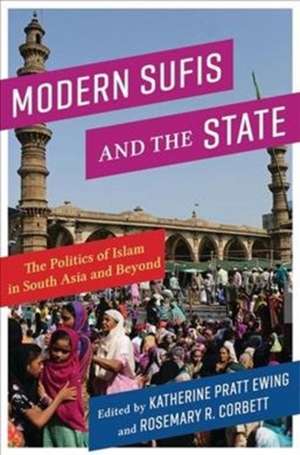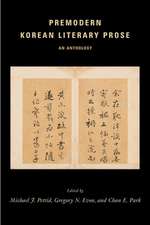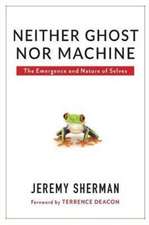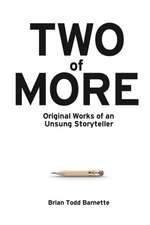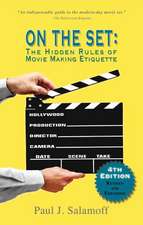Modern Sufis and the State – The Politics of Islam in South Asia and Beyond: Religion, Culture, and Public Life
Autor Katherine Pratt Ewing, Rosemary R. Corbetten Limba Engleză Paperback – 28 sep 2020
Din seria Religion, Culture, and Public Life
-
 Preț: 118.67 lei
Preț: 118.67 lei -
 Preț: 151.64 lei
Preț: 151.64 lei -
 Preț: 225.65 lei
Preț: 225.65 lei -
 Preț: 268.85 lei
Preț: 268.85 lei - 23%
 Preț: 447.94 lei
Preț: 447.94 lei - 14%
 Preț: 510.54 lei
Preț: 510.54 lei -
 Preț: 413.65 lei
Preț: 413.65 lei -
 Preț: 341.11 lei
Preț: 341.11 lei - 23%
 Preț: 621.53 lei
Preț: 621.53 lei -
 Preț: 251.53 lei
Preț: 251.53 lei - 23%
 Preț: 447.23 lei
Preț: 447.23 lei -
 Preț: 226.81 lei
Preț: 226.81 lei - 23%
 Preț: 614.70 lei
Preț: 614.70 lei -
 Preț: 249.62 lei
Preț: 249.62 lei -
 Preț: 284.90 lei
Preț: 284.90 lei -
 Preț: 215.40 lei
Preț: 215.40 lei -
 Preț: 264.38 lei
Preț: 264.38 lei -
 Preț: 295.18 lei
Preț: 295.18 lei -
 Preț: 214.63 lei
Preț: 214.63 lei -
 Preț: 278.46 lei
Preț: 278.46 lei -
 Preț: 278.46 lei
Preț: 278.46 lei -
 Preț: 274.22 lei
Preț: 274.22 lei -
 Preț: 237.07 lei
Preț: 237.07 lei -
 Preț: 252.50 lei
Preț: 252.50 lei -
 Preț: 250.55 lei
Preț: 250.55 lei -
 Preț: 268.20 lei
Preț: 268.20 lei -
 Preț: 274.64 lei
Preț: 274.64 lei -
 Preț: 262.09 lei
Preț: 262.09 lei -
 Preț: 273.04 lei
Preț: 273.04 lei -
 Preț: 252.50 lei
Preț: 252.50 lei -
 Preț: 473.95 lei
Preț: 473.95 lei -
 Preț: 284.90 lei
Preț: 284.90 lei -
 Preț: 512.78 lei
Preț: 512.78 lei -
 Preț: 277.53 lei
Preț: 277.53 lei -
 Preț: 282.02 lei
Preț: 282.02 lei
Preț: 278.46 lei
Nou
Puncte Express: 418
Preț estimativ în valută:
53.28€ • 55.77$ • 44.35£
53.28€ • 55.77$ • 44.35£
Carte tipărită la comandă
Livrare economică 31 martie-14 aprilie
Preluare comenzi: 021 569.72.76
Specificații
ISBN-13: 9780231195751
ISBN-10: 0231195753
Pagini: 344
Dimensiuni: 155 x 240 x 20 mm
Greutate: 0.48 kg
Editura: Columbia University Press
Seria Religion, Culture, and Public Life
ISBN-10: 0231195753
Pagini: 344
Dimensiuni: 155 x 240 x 20 mm
Greutate: 0.48 kg
Editura: Columbia University Press
Seria Religion, Culture, and Public Life
Notă biografică
Katherine Pratt Ewing is professor of religion at Columbia University and professor emerita of cultural anthropology at Duke University. Her books include Arguing Sainthood: Modernity, Psychoanalysis, and Islam (1997) and Stolen Honor: Stigmatizing Muslim Men in Berlin (2008).
Rosemary R. Corbett is the author of Making Moderate Islam: Sufism, Service, and the ¿Ground Zero Mosque¿ Controversy (2017). She is a faculty fellow for the Bard Prison Initiative and holds a PhD in religion from Columbia University.
Rosemary R. Corbett is the author of Making Moderate Islam: Sufism, Service, and the ¿Ground Zero Mosque¿ Controversy (2017). She is a faculty fellow for the Bard Prison Initiative and holds a PhD in religion from Columbia University.
Cuprins
Acknowledgments
Note on Transliteration
Introduction: Sufis and the State: The Politics of Islam in South Asia and Beyond, by Katherine Pratt Ewing
Part I: Sufism and Its Modern Engagements with a Global Order
1. Anti-Colonial Militants or Liberal Peace Activists? The Role of Private Foundations in Producing Pacifist Sufis During the Cold War, by Rosemary R. Corbett
2. From Täawwuf Modern to Neo-Sufism: Nurcholish Madjid, Fazlur Rahman, and the Development of an Idea, by Verena Meyer
3. Beyond Barelwiism: Tahir-ul-Qadri as an Example of Trends in Global Sufism, by Marcia Hermansen
Commentary on Part I: Ambiguities and Ironic Reversals in the Categorization of Sufism, by Carl W. Ernst
Part II: Sufis, Sharia, and Reform
4. Is the Taliban Anti-Sufi? Deobandi Discourses on Sufism in Contemporary Pakistan, by Brannon D. Ingram
5. Sufism Through the Prism of Sharia: A Reformist Barelwi Girls¿ Madrasa in Uttar Pradesh, India, by Usha Sanyal
6. Lives of a Fatwa: Sufism, Music, and Islamic Reform in Kachchh, Gujarat, by Brian E. Bond
Commentary on Part II:Sufis, Sharia, and Reform, by Muhammad Qasim Zaman
Part III: Sufis and Politics in Pakistan
7. ¿A Way of Life Rather Than an Ideology?¿: Sufism, P¿rs, and the Politics of Identity in Sindh, by Sarah Ansari
8. Sufi Politics and the War on Terror in Pakistan: Looking for an Alternative to Radical Islamism?, by Alix Philippon
9. ¿Our Vanished Lady¿: Memory, Ritual, and Shi¿i-Sunni Relations at B¿b¿ P¿k D¿man, by Noor Zaidi
Commentary on Part III: The Problems and Perils of Translating Sufism as ¿Moderate Islam,¿ by SherAli Tareen
Part IV: Sufism in Indian National Spaces
10. Is All Politics Local? Neighborhood Shrines and Religious Healing in Contemporary India, by Carla Bellamy
11. Sufi Healing and Secular Psychiatry in India, by Helene Basu
12. Sufi Sound, Sufi Space: Indian Cinema and the Mise-en-Scène of Pluralism, by Rachana Rao Umashankar
Commentary on Part IV: Sufism in Indian National Spaces, by Bruce B. Lawrence
Conclusion: Thinking Otherwise, by Rosemary R. Corbett
Notes
Glossary
Bibliography
List of Contributors
Index
Note on Transliteration
Introduction: Sufis and the State: The Politics of Islam in South Asia and Beyond, by Katherine Pratt Ewing
Part I: Sufism and Its Modern Engagements with a Global Order
1. Anti-Colonial Militants or Liberal Peace Activists? The Role of Private Foundations in Producing Pacifist Sufis During the Cold War, by Rosemary R. Corbett
2. From Täawwuf Modern to Neo-Sufism: Nurcholish Madjid, Fazlur Rahman, and the Development of an Idea, by Verena Meyer
3. Beyond Barelwiism: Tahir-ul-Qadri as an Example of Trends in Global Sufism, by Marcia Hermansen
Commentary on Part I: Ambiguities and Ironic Reversals in the Categorization of Sufism, by Carl W. Ernst
Part II: Sufis, Sharia, and Reform
4. Is the Taliban Anti-Sufi? Deobandi Discourses on Sufism in Contemporary Pakistan, by Brannon D. Ingram
5. Sufism Through the Prism of Sharia: A Reformist Barelwi Girls¿ Madrasa in Uttar Pradesh, India, by Usha Sanyal
6. Lives of a Fatwa: Sufism, Music, and Islamic Reform in Kachchh, Gujarat, by Brian E. Bond
Commentary on Part II:Sufis, Sharia, and Reform, by Muhammad Qasim Zaman
Part III: Sufis and Politics in Pakistan
7. ¿A Way of Life Rather Than an Ideology?¿: Sufism, P¿rs, and the Politics of Identity in Sindh, by Sarah Ansari
8. Sufi Politics and the War on Terror in Pakistan: Looking for an Alternative to Radical Islamism?, by Alix Philippon
9. ¿Our Vanished Lady¿: Memory, Ritual, and Shi¿i-Sunni Relations at B¿b¿ P¿k D¿man, by Noor Zaidi
Commentary on Part III: The Problems and Perils of Translating Sufism as ¿Moderate Islam,¿ by SherAli Tareen
Part IV: Sufism in Indian National Spaces
10. Is All Politics Local? Neighborhood Shrines and Religious Healing in Contemporary India, by Carla Bellamy
11. Sufi Healing and Secular Psychiatry in India, by Helene Basu
12. Sufi Sound, Sufi Space: Indian Cinema and the Mise-en-Scène of Pluralism, by Rachana Rao Umashankar
Commentary on Part IV: Sufism in Indian National Spaces, by Bruce B. Lawrence
Conclusion: Thinking Otherwise, by Rosemary R. Corbett
Notes
Glossary
Bibliography
List of Contributors
Index
